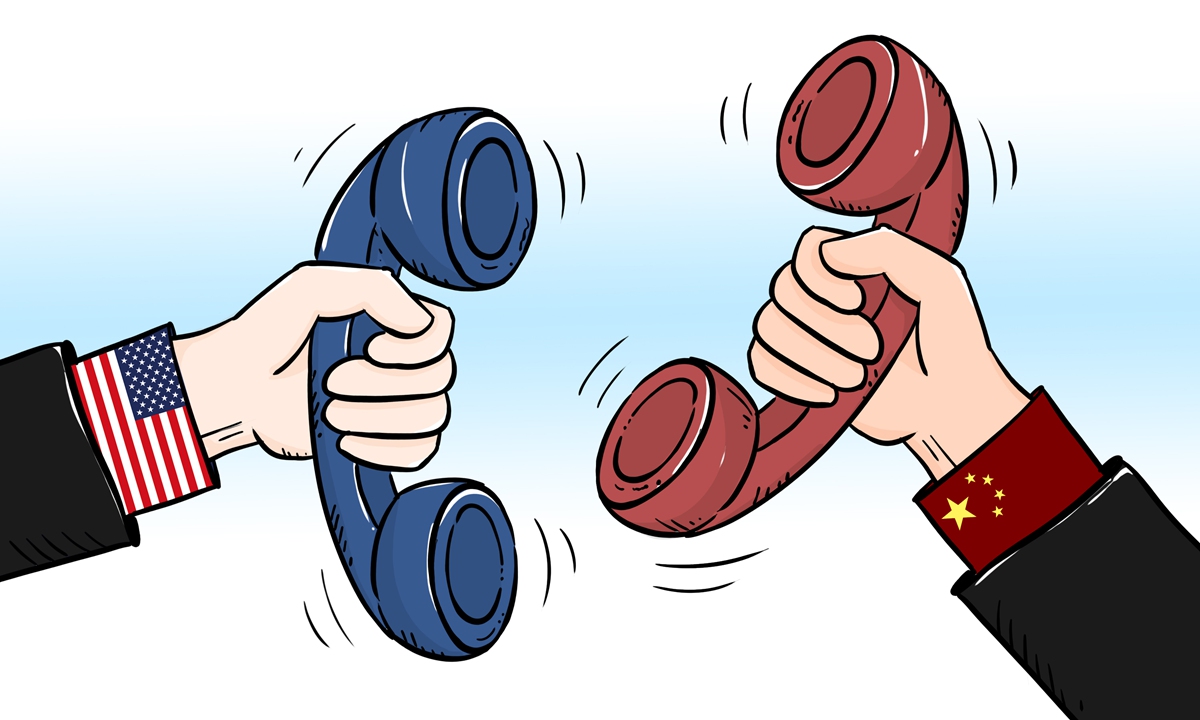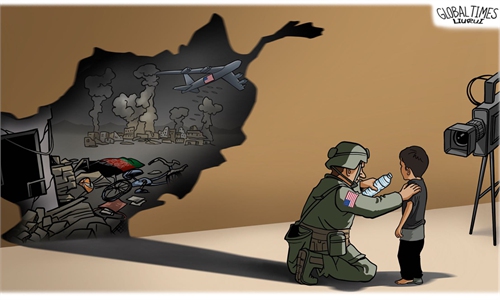COMMENTS / EXPERT ASSESSMENT
Beijing needs to see how the White House will ‘responsibly manage competition’

Illustration: Chen Xia/Global Times
Chinese President Xi Jinping and US President Joe Biden held a 90-minute phone call on Friday, the first in seven months. The "candid" and "straightforward" discussion between the two leaders about the current state of China-US relations and other global affairs is an indication that Washington has, finally, realized that engagement between the world's two major powers is better than cut-throat competition and confrontation.From Covid-19 prevention and containment, economic recovery, climate change and a wide range of global affairs, the Biden administration is now aware that it cannot make any meaningful progress without China's participation and help.
After his calamitous debacle in Afghanistan, which many are already referring to as "Biden's Benghazi Moment", Biden's political legacy, should he have one, will be catastrophically damaged should he abandon or even destroy relations with China. Continuing to ratchet up stress on already strained relations would be a fatal mistake by Team Biden.
President Biden "underscored the US' enduring interest in peace" and "the two leaders discussed the responsibility of both nations to ensure competition does not veer into conflict", according to a press release circulated by the White House. It is expected the two countries' top military officers will sit down and negotiate an effective way to maintain dialogue, trying to short-circuit the possibility of miscalculation and prevent a hot conflict from happening.
Biden promised that his administration will continue to follow the one-China principle, which is an important policy reconfirmation, and is expected to reduce the risk of a military showdown concerning the Taiwan island.
Biden has recently found himself waist deep in political quicksand, facing a tempest of criticism from both the Republicans and his fellow Democrats as well as the broader US media, for his bungling of the withdrawal of American troops from Afghanistan. His support among American voters has been further eroded by a recent flare-up of the deadly Delta variant of the coronavirus, and a nascent economic recovery that seems stranded on the tarmac.
Meanwhile, the American polity and the whole society are increasingly polarized, as Americans become ever more dissatisfied with issues relating to inequality, race, abortion rights, immigration and the ideological partition of the two major parties. Following a bloody riot at the US Capitol orchestrated by white supremacists on January 6, former president Donald Trump is reportedly to attempt a political comeback to the White House, laying bare the twisted landscape of US politics.
As climate change inflicts more destruction on the US, from the scalding heat waves in the summer and devastating forest fires along the west coast, to downpours and floodwaters that inundated low-lying communities in New York and New Jersey in New England. Extreme weather patterns will become more frequent across the globe if the US and China do not cooperate and lead the world to combat carbon dioxide emissions, and the time is running out.
Nearly eight months after his inauguration, Biden has finally understood the significance of China's participation, advice and cooperation in addressing major challenges faced by the world, including the US.
Fierce competition and rivalry with China which the Biden administration inherited from Trump - applying tariffs and sanctions on China - is not doing the US any good.
American consumers are complaining about inflated prices because of tariffs, corporate America are lamenting about disrupted supply chains of semiconductors and materials and lost market shares because of China's tit-for-tat taxes and counter-sanctioning measures.
The rate of US inflation has hovered at more than 5 percent over the past three months, while its economic recovery is facing an abrupt slowdown as the third and fourth quarter GDP growth is likely to be halved from the first half year.
In sharp contrast, China's economy has weathered the US' assault policy quite well. The country's exports keep accelerating, including to the US. China's imports have surged too, leading many allies of the US in Asia and Europe, to find it difficult to turn away from the 1.4-billion-population market than they had previously thought.
China's economy is predicted to grow by 9-10 percent as all its industrial sectors are firing on full cylinders, thanks to Beijing's sweeping measures and well-coordinated policies that have helped contain Covid-19 epidemic. In the US, the Delta variant resurgence is dampening economic activity, with new daily infections and deaths making up approximately 1/6 of the world's total.
On the Biden administration's lack of decisiveness in reviewing Trump's punitive tariffs and other restrictive trade measures, American businesses are unhappy. They see Biden's so-called "worker-centered" trade policy as looking exactly like Trump's "America First" model when it comes to China. American businesses have aired grievances that it is almost nine months into "this administration and we haven't seen anything about what the trade policy is or what it's going to be".
The two presidents "agreed to engage" on the issues openly and in a straight forward manner, said the White House press release. "This discussion, as President Biden made clear, was part of the United States' ongoing effort to responsibly manage the competition" between the two countries.
China could be very cautious and wait to ascertain how the US government will "responsibly manage the competition".
If Team Biden continues to let its sanctioning measures spill into technology and finance for a decoupling from China, or play the geopolitical landscape game by luring India, Japan and Australia to a closer Quad regime that shadows and endangers China's national security, there will be no way for China to cooperate with the US to jump start its economy or cooperate on Afghanistan, climate change and other issues. What the top authorities in Beijing should focus on is to strengthen China's national strength across the economy, technology and defense.
The author is an editor with the Global Times. bizopinion@globaltimes.com.cn



